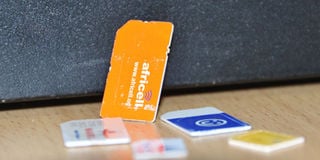Africell faces suspension over breach of sim cards directive

UCC says Africell has been selling Sim cards in ungazetted places. PHOTO BY ERONIE KAMUKAMA
What you need to know:
Disregarding directives. UCC says Africell has continued to sell Sim cards in ungazetted places in total disregard of directives issued on March 7.
Uganda Communications Commission has asked Africell to show cause why it should not suspend its license over failure to follow required guidelines.
In a May 17 letter signed by Mr Godfrey Mutabazi, the UCC executive director, the regulator accuses Africell of ignoring directives that sought to stop the sale of sim cards in ungazetted places, which had been banned in different notices issued on March 7 and 8.
“This action amounts to a serious and repeated breach of Africell’s license agreement. In light of [this] the Commission shall within 60 days from the date hereof suspend [your] license, unless [you] shows cause why the suspension should not be effected,” the letter reads in part.
UCC accuses Africell of selling sim cards on the streets, using hawkers, street vendors and mobile agents “in total disregard of the Commission’s directive”.
Africell has 60 days within which it has to explain why its license should not be suspended.
“Please be advised should the Commission not receive sufficient representation within the aforementioned, the Commission shall proceed to suspend [your] license,” Mr Mutabazi, said in the letter.
Mr Edgar Karamagi, the Africell public relations officer on Monday acknowledged receipt of the letter but said they had not breached any directive adding they had followed UCC guidelines.
“We have been and remain compliant to government regulations across board. The incident referred to by UCC pertains to remote areas where registration was done according to the regulations of UCC which are, on-the-spot biometric verification and live validation by National Identification and Registration Authority (NIRA guidelines),” he said.
According to Mr Karamagi, UCC allowed on-the-spot biometric verification and live validation, whereby registration of customers’ sim cards needs their physically presence in addition to their identity cards.
The process, he says, works in a way that the machine scans and brings the national ID information from NIRA after which the customer is required to do a fingerprint scan to ascertain ownership of the Identity Card.
At the height of the killing of Susan Magara, who had been kidnapped for about 27 days with the kidnappers communicating to her relatives through mobile phones, UCC accused telecoms of selling unregistered sim cards that had given criminals an opportunity to commit crime without detection.
This forced the regulator to ban the sale of sim cards until when all telecoms had been provided with gadgets that have capacity to identify people using fake national IDs to register sim cards. The ban has since been lifted with all telecoms now registering and issuing Sim cards at their service centres.
Mr Karamagi told Daily Monitor that Africell was ready to defend its license and would furnish UCC with all required details to prove that they were acting within the law and available guidelines.
“Africell is one of the first operators that begun advocating for bio metric finger print registration having seen this need as far back as mid-2017. Our position on registration has not changed and we will prove the same to UCC within the 60 days we were asked to respond,” he said.
Implications
Still under consideration. Mr Mutabazi yesterday told Daily Monitor that in the event that the license is revoked, Africell customers would be required to move to other networks as they will not be able to make calls or load airtime.
However, for now, according to Mr Mutabazi, “it is still a notice awaiting a strong representation from them [Africell].”
Africell, together with Airtel have also been previously accused by government of selling unregistered sim cards which crimanals have used to commit crimes.



